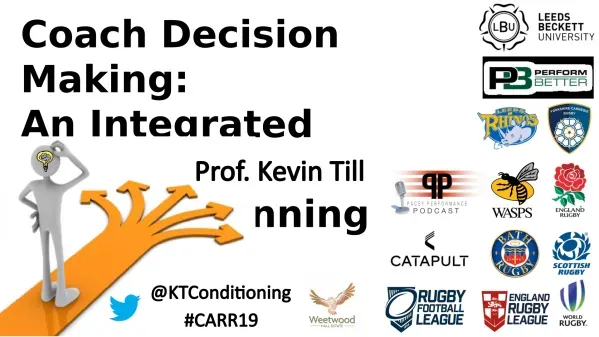
Integrated Planning Strategies for Coaches
Document information
| Author | Lara-Bercial |
| instructor | Prof. Kevin Till |
| School | Not Specified |
| Major | Coaching |
| Year of publication | 2019 |
| Place | Not Specified |
| Document type | presentation |
| Language | English |
| Number of pages | 41 |
| Format | |
| Size | 23.89 MB |
- Coaching
- Planning
- Athlete Development
Summary
I. Introduction to Planning
Planning is a critical component in coaching, serving as the foundation for effective decision-making. It involves a detailed process of determining how to achieve specific goals before initiating actions. The document emphasizes that planning is not merely a preliminary step but an ongoing process that requires continuous reflection and adjustment. Coaches must understand the significance of both short-term and long-term planning. Short-term planning focuses on immediate sessions, while long-term planning encompasses broader objectives that may span several years. This dual approach ensures that coaches can adapt to the evolving needs of their athletes while maintaining a clear vision for future development. As stated, 'So, Coach Planning is a Decision-Making Process,' highlighting the integral role of planning in guiding coaching strategies and athlete development.
1.1 The Nature of Planning
The essence of planning lies in its ability to structure the coaching process. It requires coaches to think critically about the activities necessary to achieve desired outcomes. The document reiterates that effective planning involves understanding the context, culture, and resources available. Coaches must ask themselves, 'Who are you coaching? What are you coaching? How are you coaching?' These questions guide the planning process, ensuring that it is tailored to the specific needs of the athletes. The emphasis on a decision-making process underscores the dynamic nature of coaching, where plans must be flexible and responsive to real-time feedback and changing circumstances.
II. Understanding Athletes Needs
A key aspect of effective coaching is understanding the diverse needs of athletes. The document introduces the concept of a participant continuum, which categorizes athletes based on their achievements and personal goals. This framework includes three categories: Elite Referenced Excellence, Personal Referenced Excellence, and Participation for Personal Wellbeing. By recognizing these distinctions, coaches can tailor their approaches to meet the varying motivations and aspirations of their athletes. The document states, 'Achievement is measured against others' for elite athletes, while personal achievement is emphasized for others. This understanding allows coaches to create a more inclusive and supportive environment that fosters growth and development.
2.1 Bio Psycho Social Considerations
Coaches are encouraged to utilize bio-psycho-social theories to gain insights into their athletes' needs. Factors such as age, injury history, and psychological characteristics play a significant role in shaping an athlete's experience. The document highlights the importance of assessing these elements to create a comprehensive profile of each athlete. By doing so, coaches can design training programs that not only enhance physical performance but also address mental and emotional well-being. This holistic approach is essential for fostering resilience and long-term success in athletes, as it acknowledges the multifaceted nature of their development.
III. Planning and Delivery Framework
The document outlines a structured framework for planning and delivering coaching sessions. It emphasizes the importance of recognizing both group and individual needs when designing training activities. Coaches must set clear learning and development objectives that are justified and understood by all participants. The framework encourages coaches to select appropriate training focuses based on the specific needs of their athletes. As stated, 'Select the appropriate TRAINING FOCUS – which ACTIVITIES will form a suitable base for engagement.' This strategic approach ensures that training sessions are not only effective but also engaging, fostering a positive learning environment.
3.1 Integration of Feedback
An essential component of the planning and delivery framework is the integration of feedback. Coaches are urged to continuously monitor and evaluate the effectiveness of their training sessions. This involves soliciting feedback from athletes and making necessary adjustments to improve future sessions. The document highlights that effective coaching is a cyclical process of planning, delivering, and reflecting. By embracing this iterative approach, coaches can enhance their effectiveness and better support their athletes' development. The emphasis on learner engagement and adaptive coaching strategies underscores the importance of creating a responsive coaching environment that prioritizes athlete needs.
Document reference
- The Practices and Developmental Pathways of Professional and Olympic Serial Winning Coaches (Lara-Bercial & Mallett)
- Working Fast and Working Slow: The Benefits of Embedding Research in High-Performance Sport (Coutts)
- Accessing off-field brains in sport; an applied research model to develop practice (Jones et al.)
- Three Worlds: new directions in participant development in sport and physical activity (Collins et al.)
- The Effects of Augmented Feedback on Sprint, Jump, and Strength Adaptations in Rugby Union Players Following a Four Week Training Programme (Weakley et al.)
